Uvi Poznansky's Blog, page 279
April 3, 2012
In Praise of Reviewers
Until recently, I found it difficult to grasp for words when asked, "What is your story, Apart From Love, about?" just as if I were asked, "What is your life about?" The question, I thought with a tinge of resentment, was too vague, too big, too something, and really, why don't your read it yourself and tell me! I'm afraid that the ways I stumbled in an effort to come up with some semblance of a description managed to convince my listeners that I may have some talents, but for sure, putting words together is not one of them.
And perhaps it was not words I needed--but distance. When you craft each piece of a story, you often find yourself too close to it. Perhaps you can describe that piece--the string of thoughts around a particular event, teased up from the yarn you are spinning--but what you lack is an overall perspective. What does it all add up to? What kind of a fabric is it in the end?
Luckily, this was when my reviewers started coming in to the rescue. I was truly amazed how easily they reflect on a story. They provide a great service, most of all to the readers, but also to me, polishing that mirror, so now I can see myself.
I am so grateful to Grady Harp, an Amazon Hall of Fame Reviewer for the years 2006, 2007, 2008, 2009, 2010, and 2011 (not an easy feat, considering the constant, fierce competition between the top reviewers to achieve that disticntion); Vine Voice Amazon reviewer James L. Woolridge, Kathy Parsons, a Top 1000 Amazon Reviewer and an independent piano teacher since 1981, Vine Voice Amazon reviewer Valerie Matteson, and other readers.
Please take a look at their great reviews and, if you find them helpful, please reward them! (Hint: You'll know what to do when you see the YES button under each review.)
And perhaps it was not words I needed--but distance. When you craft each piece of a story, you often find yourself too close to it. Perhaps you can describe that piece--the string of thoughts around a particular event, teased up from the yarn you are spinning--but what you lack is an overall perspective. What does it all add up to? What kind of a fabric is it in the end?
Luckily, this was when my reviewers started coming in to the rescue. I was truly amazed how easily they reflect on a story. They provide a great service, most of all to the readers, but also to me, polishing that mirror, so now I can see myself.
I am so grateful to Grady Harp, an Amazon Hall of Fame Reviewer for the years 2006, 2007, 2008, 2009, 2010, and 2011 (not an easy feat, considering the constant, fierce competition between the top reviewers to achieve that disticntion); Vine Voice Amazon reviewer James L. Woolridge, Kathy Parsons, a Top 1000 Amazon Reviewer and an independent piano teacher since 1981, Vine Voice Amazon reviewer Valerie Matteson, and other readers.
Please take a look at their great reviews and, if you find them helpful, please reward them! (Hint: You'll know what to do when you see the YES button under each review.)
Published on April 03, 2012 08:43
March 30, 2012
In My Defense
In a recent exhibition at the Getty museum I saw a little sketch by Rembrandt, showing the master artist and his students carefully observing a model, who is posing on a stage in his studio, and drawing her. It inspired me to create a variation on the theme: I used the same grouping of figures, where the woman is set apart from the rest of them, but changed the environment from a studio to a cave, and the figures from art students to a primitive mob. It brings out some primal emotion in all of them. Here is the watercolor I painted:
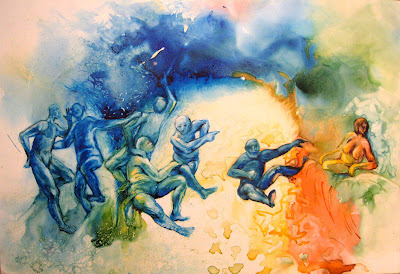
While in this painting the woman turns her head away, as if she has no voice, she talked loud and clear in the chapter In My Defense, in my book Apart From Love. Here is what Anita says:
In my defense I have this to say: When men notice me, when the lusty glint appears in their eyes, which betrays how, in their heads, they're stripping me naked—it's me they accuse of being indecent. Problem is, men notice me all the time.


While in this painting the woman turns her head away, as if she has no voice, she talked loud and clear in the chapter In My Defense, in my book Apart From Love. Here is what Anita says:
In my defense I have this to say: When men notice me, when the lusty glint appears in their eyes, which betrays how, in their heads, they're stripping me naked—it's me they accuse of being indecent. Problem is, men notice me all the time.
Published on March 30, 2012 18:01
March 29, 2012
The Entertainer
When I was six years old, I would sometimes sit, utterly silent, behind my best friend Lilit as she played her piano. The sound of her music fascinated me to such a degree that I begged my parents to enroll me in piano lessons, too. Being sensible, they decided to take my aspirations one step at a time. So instead of a grand piano, they bought me a piccolo, and started me off in a class where thirty kids puffed, wheezed and blasted—more or less at once—through their wind instruments with various degrees of success, producing a hilarious cacophony that had little to do with music. This ended my artistic ambitions right there and then, validating my parents' decision to exercise caution with what I had said I wanted.Then a year ago, I introduced a white piano into my story Apart From Love. The mere presence of this instrument in Ben's apartment suggested a variety of scenes, such as the musical duet in chapter 18. Now, how would you go about writing a duet, when your knowledge about playing the piano is nothing but a faint memory from the age of six? I found several ways of learning the intricate details. First, I watched numerous videos, the most entertaining of which is this one, showing Fran & Marlo Cowan (married 62 years) playing impromptu recital together in the atrium of the Mayo Clinic. Then I read numerous articles, like this three-step instruction about singing duets, which taught me that eye contact and exchanging nods between the two players is at least as important as striking the right notes. Next, I selected a piece of music, The Entertainer, and learned more than you ever wanted to know about every note of it, and how it should be played. I did it, among many other ways, by watching instructional videos like this one. Finally I had to fold in the difference in both musical education and temperament between Ben and Anita.
So here is an excerpt from the way it plays out in the end:And before this phrase fades out Anita straightens her back, and places her hand on the keys. Then, to my astonishment, she plays the next phrase of music, this time with raw, intense force, which I never knew existed in her, bringing it to the verge of destruction, making it explode all around me. And I, in turn, explode with the following one, because how can I let her outdo me? I am, after all, The Entertainer... Here I come! Here I drum! No more woes. Let me close! Let me in, hold me tight! Don't resist me, do not fight—At this point Anita kicks the bench back, and I tip it over behind us. She sways her hips to the beat, and I tap the floor. And we find ourselves bouncing there, almost dancing in place, playing the piano side by side: she on the high notes, I—on the low. From one musical sequence to another, the music sparkles in spite—and maybe because—of the fiery contrast between the two. Which brings me to believe that my musical aspirations at the age of six may not have been a total waste, after all.Sometimes I find myself having to take my hand away, so she can play the same key immediately after me. On some notes, my right hand crosses her left hand, in an exchange that is wild and fiery—like no duet I have ever seen, or listened to! One way or another it blends, it mixes into a sound, which you might call a crude, unruly, unrestrained racket. But to the ears of a madman, it can be called music.
So here is an excerpt from the way it plays out in the end:And before this phrase fades out Anita straightens her back, and places her hand on the keys. Then, to my astonishment, she plays the next phrase of music, this time with raw, intense force, which I never knew existed in her, bringing it to the verge of destruction, making it explode all around me. And I, in turn, explode with the following one, because how can I let her outdo me? I am, after all, The Entertainer... Here I come! Here I drum! No more woes. Let me close! Let me in, hold me tight! Don't resist me, do not fight—At this point Anita kicks the bench back, and I tip it over behind us. She sways her hips to the beat, and I tap the floor. And we find ourselves bouncing there, almost dancing in place, playing the piano side by side: she on the high notes, I—on the low. From one musical sequence to another, the music sparkles in spite—and maybe because—of the fiery contrast between the two. Which brings me to believe that my musical aspirations at the age of six may not have been a total waste, after all.Sometimes I find myself having to take my hand away, so she can play the same key immediately after me. On some notes, my right hand crosses her left hand, in an exchange that is wild and fiery—like no duet I have ever seen, or listened to! One way or another it blends, it mixes into a sound, which you might call a crude, unruly, unrestrained racket. But to the ears of a madman, it can be called music.
Published on March 29, 2012 14:56
March 28, 2012
Notes From Rio de Janeiro: What's Around Your Feet
With the stunning views of Rio de Janeiro, the last thing you want to do is hang your head down and look at the ground. And yet, this is precisely what I did, because the entire city is carpeted with black and white mosaic designs.
I imagine the designer, or team of designers, floating in Rio de Janeiro sky looking down at the city, viewing it as a huge, intricate carpet. They give a lot of thought to setting apart the bases of particular objects, such as lamp posts (see the top image). They aim to take care of you, laying a carpet at your feet, guiding you to the entrances of buildings by marking paths through the pavement. They lead you to the street crossing. They set off islands of black and white designs for street benches, and decorate with borders the edge of the pavement. They give identity to each street by giving it its own signature design, the most notable example being the beautiful wave design of the pavement at Copacabana beach.
Here are a few examples:
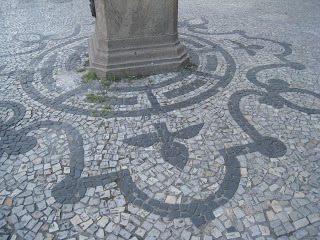
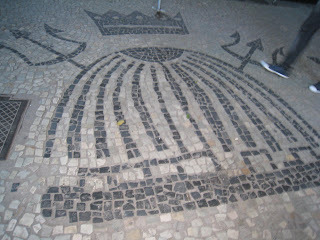
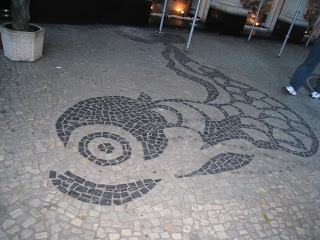
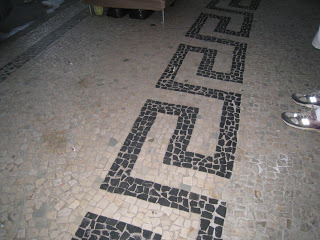
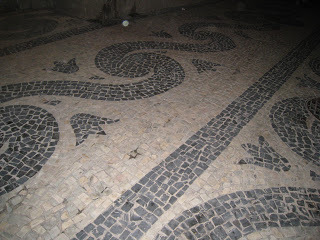
And here is another site that shows many more designs. Enjoy.
I imagine the designer, or team of designers, floating in Rio de Janeiro sky looking down at the city, viewing it as a huge, intricate carpet. They give a lot of thought to setting apart the bases of particular objects, such as lamp posts (see the top image). They aim to take care of you, laying a carpet at your feet, guiding you to the entrances of buildings by marking paths through the pavement. They lead you to the street crossing. They set off islands of black and white designs for street benches, and decorate with borders the edge of the pavement. They give identity to each street by giving it its own signature design, the most notable example being the beautiful wave design of the pavement at Copacabana beach.
Here are a few examples:





And here is another site that shows many more designs. Enjoy.
Published on March 28, 2012 12:36
March 26, 2012
Three Minute Fiction: The Hollow
She closed the book, placed it on the table, and finally decided to walk through the door. By now her eyes could barely stay open, and yet she knew, without having to look closely, that it wasn't a door really—only the opening for one. And over that threshold down there, she could somehow read the shape of the shadow. How it appeared suddenly, spilling out of nowhere, was quite beyond her, but she could tell, couldn't she, that there was no floor. This time, perhaps because of starting to fall asleep, her diary seemed heavier than usual. Getting up, she brushed her fingers over it and could feel the raised spine, and rough spots where the gold lettering spelling 'Love' had peeled off. If she were to take it with her, the book might drop from her hands. It might then continue dropping, farther and farther away from view through the empty elevator shaft, releasing letter after letter into the air, filling its darkness with white feathery pages, rustling, whispering what she had written such a long time ago, what had been clamped—until now—between the front and back covers, as if it were a flower meant for drying.Her longing for him.She wiped her face, and now her sight cleared. With every step toward that door, she could see his eyes shining brighter and brighter across from her, as if David—yes, as if he were right there, framed by the hollow. In a moment, she thought, he would reach for her hand, smiling as if nothing bad could happen. And just like that last time, he would try to lead her over the scaffolding at the tenth floor of his newly erected skyscraper, with the blueprint rolled tightly under his arm. They had been married for ten years at the time of the accident. Since then, never once did she open her diary. Reluctant to decipher her own handwriting, which had looked different back then, more childish, she kept the book closed. Let it all be forgotten: their first date, their wedding, honeymoon, because these memories would be followed—how could they not?—by that which had to be blocked: the image of him holding out his hand to guide her over, and the sound of his foot, stumbling. But this morning, for some reason, she found the book open. How could that have happened? With a sudden shiver, she turned a page. To her surprise, that didn't bring back the sight of the void. This time the slanted sky, and the twisted earth below her, framed by metal poles and wooden planks didn't rise up in a flash. So she closed her eyes, and brought back the last touch of his hand. It was as firm as ever. His fingers—she could almost feel them around her, all the way to the small of her back—his fingers gave her a sweet, strange feeling, which she had been missing for so long: the feeling of being home. That was when, with a clap, she closed the book, then went through the missing door. With one easy step, which helped her ignore how final it was, she was flying, her hair pointing up, blowing wildly in the vertical wind. At first she avoided spreading open her arms, for fear of scraping them against the walls. Then, she heard her laughter, swirling loud and free, because there were no walls, only papery architectural designs around her. Sliding dreamily down, she was closer and closer to where she was headed all these years. His kiss.
___________________________________________________________________________
This is my entry to the NPR Three Minute Fiction contest round 8. This time, the story has to start with this sentence: "She closed the book, placed it on the table, and finally, decided to walk through the door."

___________________________________________________________________________
This is my entry to the NPR Three Minute Fiction contest round 8. This time, the story has to start with this sentence: "She closed the book, placed it on the table, and finally, decided to walk through the door."
Published on March 26, 2012 16:12
March 25, 2012
Earthquake
When I finish a painting, sometimes even before the last brushstroke, I am much too eager to take a picture of it and share it with you, which results in a compromised image: the oil paint is still wet and reflects light to the camera in unintended ways. So this morning I went back to my Earthquake painting, which I finished last summer, to see if I can take a better picture than the one posted on my website.



Published on March 25, 2012 10:11
March 23, 2012
Notes from Rio de Janeiro
Looking for bus 14 in Centro, to take us up the hill to a recommended art gallery with great views of the city, we were lucky, so lucky not to understand a word of Portuguese, and not to be able to say anything beyond Obrigado, which means Thank you, to the patient locals who gestured with their hands and showered us with explanations, trying so hard to guide us out of our confusion. We were lucky because we stumbled on this gem, which the guidebook mentions only in passing, and without marking it as a start attraction (big mistake.)


It is a long staircase, (not shown here) leading uphill that is being decorated with tile by a local artist. It is still considered a 'work-in-progress'. People bring him tile from around the world to incorporate into his design. The highlights of the design are beautifully drafted local scenes, as well as a self-portrait of the artist himself, the way he chooses to see himself: with big mustaches, big belly and big breasts.

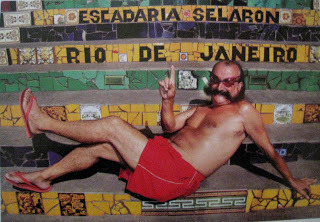



It is a long staircase, (not shown here) leading uphill that is being decorated with tile by a local artist. It is still considered a 'work-in-progress'. People bring him tile from around the world to incorporate into his design. The highlights of the design are beautifully drafted local scenes, as well as a self-portrait of the artist himself, the way he chooses to see himself: with big mustaches, big belly and big breasts.


Published on March 23, 2012 13:58
March 20, 2012
In Praise of Simple Objects: The Coffee Percolator, the Telephone and the Clock
In my book Apart From Love, Ben senses from the start that Anita, his father's new wife, may be lonely in the old apartment where he grew up. She is surrounded by yellowing pictures, besieged by forgotten history, which must seem distant to her, because it belongs to others. If you had to design a movie set to bring this situation to life, what furniture would you use? What objects would you place on the furniture? How old would these objects be? Whose style do they reflect? How would these objects appear in daylight? In the dark? In what ways would the sight and sound of them create a mood for the characters?I chose all the objects in the story to reflect a dated taste--that of the previous wife, Natasha--so as to force Anita into surviving in a world that she had no hand in creating. Here is one of the earlier descriptions of her use of the coffee percolator:Now there she stands, by the counter, measuring the coarsely ground coffee, one tablespoon then another, right into the basket of our coffee percolator. He groans, which sounds like a bubble over a flame.The telephone cord is described in another chapter as a snake: The cord is stretching tensely in midair, or slithering behind his back as he goes back to hobbling to and fro across the floor. The Clock appears numerous times, at daylight and at all hours of the night, to punctuate a mood of anticipation. So you know that when it would finally ring its alarm, it would bring the characters to an abrupt halt. Of course, it is not a digital clock--much too sleek and simple!--but an old alarm clock with the little hammer on top:Under the glass crystal, the black hand moves around the dial, from one minute mark to the next. It advances with a measured beat, the beat of loss, life, fear...At first, all's black around me—except for the two luminous tips, which mark the hands of the alarm clock down there, in the hall...For him, all them sounds are being drowned out by the tick, the incessant tick, tick, tick of the old alarm clock. The little hammer on top of it is idle, and so is the twin bells. They're just hanging there, left and right of the hammer, reflecting this whole room, and the piano, and us, too. We seem so unlike ourselves, bent out of shape in their brass finish. So tense, so distorted, so small. 
Published on March 20, 2012 11:21



